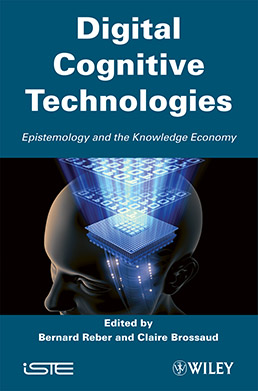
Digital Cognitive Technologies is an interdisciplinary book which assesses the socio-technical stakes of Information and Communication Technologies (ICTs), which are at the core of the “Knowledge Society”. This book addresses eight major issues, analyzed by authors writing from a Human and Social Science and a Science and Technology perspective. The contributions seek to explore whether and how ICTs are changing our perception of time, space, social structures and networks, document writing and dissemination, sense-making and interpretation, cooperation, politics and the dynamics of collective activity (socio-informatics).
Part 1. Can ICT Tell History?
1. Elements for a Digital Historiography, Andrea Iacovella.
2. “In Search of Real Time” or Man Facing the Desire and Duty of Speed, Luc Bonneville and Sylvie Grosjean.
3. Narrativity Against Temporality: A Computational Model for Story Processing, Eddie Soulier.
Part 2. How Can We Locate Ourselves Within ICT?
4. Are Virtual Maps used for Orientation?, Alain Milon.
5. Geography of the Information Society, Henry Bakis and Philippe Vidal.
6. Mapping Public Web Space with the Issuecrawler, Richard Rogers.
Part 3. ICT: A World of Networks?
7. Metrology of Internet Networks, Nicolas Larrieu and Philippe Owezarski.
8. Online Social Networks: A Research Object for Computer Science and Social Sciences, Dominique Cardon and Christophe Prieur.
9. Analysis of Heterogenous Networks: The ReseauLu Project, Alberto Cambrosio, Pascal Cottereau, Stefan Popowycz, Andrei Mogoutov and Tania Vichnevskaia.
Part 4. Computerized Processing of Speeches and Hyperdocuments: What are the Methodological Consequences?
10. Hypertext, an Intellectual Technology in the Era of Complexity, Jean Clément.
11. A Brief History of Software Resources for Qualitative Analysis, Christophe Lejeune.
12. Sea Peoples, Island Folk: Hypertext and Societies without Writing, Pierre Maranda.
Part 5. How Do ICT Support Pluralism of Interpretations?
13. Semantic Web and Ontologies, Philippe Laublet.
14. Interrelations between Types of Analysis and Types of Interpretation, Karl M. Van Meter.
15. Pluralism and Plurality of Interpretations, François Daoust and Jules Duchastel.
Part 6. Distance Cooperation
16. A Communicational and Documentary Theory of ICT, Manuel Zacklad.
17. Knowledge Distributed by ICT: How do Communication Networks Modify Epistemic Networks?, Bernard Conein.
18. Towards New Links between HSS and Computer Science: the CoolDev Project, Grégory Bourguin and Arnaud Lewandowski.
Part 7. Towards Renewed Political Life and Citizenship
19. Electronic Voting and Computer Security, Stéphan Brunessaux.
20. Politicization of Socio-technical Spaces of Collective Cognition: The Practice of Public Wikis, Serge Proulx and Anne Goldenberg.
21. Liaising using a Multi-agent System, Maxime Morge.
Part 8. Is “Socio-Informatics” Possible?
22. The Interdisciplinary Dialog of Social Informatics, William Turner.
23. Limitations of Computerization of Sciences of Man and Society, Thierry Foucart.
24. The Internet in the Process of Data Collection and Dissemination, Gaël Gueguen and Saïd Yami.
Bernard Reber is a moral and political philosopher, and a research fellow at the CNRS-University Paris Descartes, France. His work centers on pluralist moral assessment of controversial technologies.
Claire Brossaud is a sociologist based in Paris. Her research concerns ICTs and their relations with urban and environmental politics, and epistemology. This is her fourth book.